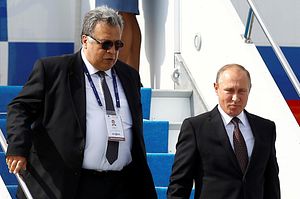The Russian ambassador to Turkey was shot at an art exhibit in Ankara Monday by a man who was recorded shouting about Syria. The ambassador died at the scene and the assassin was killed by security forces shortly after.
The entire episode was captured on video as Ambassador Andrey Karlov was delivering remarks opening a photography exhibit titled “Russia through the Traveler’s Eyes.” The Hurriyet Daily News reports that the shooter shouted, “Don’t forget Aleppo! Don’t forget Syria! As long as our brothers are not safe, you will not enjoy safety.” The shooter’s remarks were mostly in Turkish, although he also shouted the Arabic phrase “Allahu Akbar. ”(Note: I will not link to the video here due to its graphic nature.)
The shooter was dressed in a suit and tie and in eerie photographs taken by AP photographer Burhan Ozbilici, he is seen looming behind the ambassador. As The Guardian reports, Turkish officials say that the shooter entered the gallery claiming to be a police officer.
The killing comes at a particularly tense time in the region. Karlov had been a part of discussions between Russia, Iran, and Turkey with regard to Aleppo and Turkish Foreign Minister Mevlüt Çavuşoğlu was previously scheduled to fly to Moscow for continued talks between the three states. Russian media has described the ongoing situation in Aleppo as a “liberation” and an “evacuation.” U.S. Secretary of State John Kerry has described it as “nothing short of a massacre.”
Russia firmly backs the regime of Bashar al-Assad, while Turkey has more selective interests — anti-Assad but very much in need of support in its conflict with Kurdish militias.
AP reports that Ankara’s mayor, Melih Gokcek, said that the attack was aimed at disrupting the Turkish-Russian rapprochement.
In November 2015, Turkey shot down a Russian jet on the Turkish-Syrian border. The incident led to a breakdown of relations between the two countries: Russian President Vladimir Putin called Turkey “accomplices of terrorists” and imposed sanctions on Turkey as well as suspending visa-free travel and package vacations to the country.
Throughout the first seven months of 2016, the two countries worked toward a rapprochement but the slow recovery of relations between Ankara and Moscow was jump-started by the failed July 15 coup attempt. In the weeks after, as Ankara hunted down Gulenists and media alike, the narrative about the November shoot-down changed. Eventually the Turkish authorities (and pro-government media) claimed that the pilot acted alone and was, in fact, a supporter of the coupmakers.
Gokcek, the Ankara mayor, was vocal in rewriting the state’s narrative. As I wrote in late July:
His comments, noted by Al Jazeera, referenced the so-called parallel state Turkish President Recep Tayyip Erdoğan says [Fethullah] Gülen created. Gokcek blamed “the parallels” for the spike in Russian-Turkish tensions. “That incident [the downing of the Russian plane] was orchestrated by a pilot who belongs to the parallel state,” he said. “I say this one hundred percent. We were not voicing this before, we were gulping this down… But, now I say this, as Melih Gokcek, these rascals caused the rift between Russia and us.”
The assassination of the Russian ambassador to Turkey will reverberate, through exactly how depends on the way in which the media in Turkey and Russia spin the killing. One might be tempted to assume it will lead to renewed deterioration of relations between the two states, but that is not necessarily the most likely outcome.
Pro-government media in both states re-wrote the narrative regarding the jet shoot-down, with some going as far as suggesting it was a “false flag” operation conducted by the United States. And indeed, a similar narrative is emerging already. If anything, this may harden Erdogan’s siege mentality, and lend fresh motivation to crackdowns on media and dissidents.
At a time when Turkey needs the best journalists it can muster to help the world understand local dynamics (for example, how Turkish citizens feel about what’s happening in Syria and their own government’s policies and place in the chaos) the state has led a massive crackdown on independent media. According to the Committee to Protect Journalists, at least 81 journalists remain in detention in Turkey on anti-state charges, leading the world in jailed journalists.

































